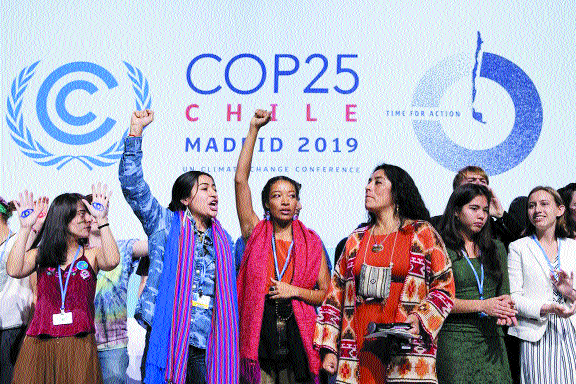Five reasons why COP25 climate talks in Madrid failed
| Date :26-Dec-2019 |
PARIS
THE climate summit in Madrid earlier this month did not collapse - but by almost any measure it certainly failed.
Five years after the fragile UN process yielded the world’s first universal climate treaty, COP25 was billed as a mopping-up session to finish guidelines for carbon markets, thus completing the Paris Agreement rulebook.

Activists hold a rally on stage at the UN COP25 climate negotiations in Madrid, calling for more aggressive cuts to emissions and more international aid to vulnerable countries. (AFP/file photo)
Governments faced with a crescendo of deadly weather, dire alarms from science and weekly strikes by millions of young people were also expected to signal an enhanced willingness to tackle the climate crisis threatening to unravel civilisation as we know it. The result? A deadlock and a dodge. The 12-day talks extended two days into overtime but still punted the carbon market conundrum to next year’s COP26 in Glasgow.
United Nations Secretary-General Antonio Guterres labelled COP25 “disappointing”. Others were more blunt.
At least five factors contributed to the Madrid meltdown.
AMATEUR HOUR
To an unsettling degree, the outcome of a UN climate summit -- where 196 nations must sign off on every decision -- depends on the savvy and skill of the host country, which acts as a facilitator. The stars were not aligned for the chaotic Copenhagen summit of 2009 and the Danish Prime Minister’s less-than-deft manoeuvering did not help. By contrast, the 2015 climate treaty was in no small measure made possible by France’s diplomatic tour-de-force.
FOX IN THE HENHOUSE
Among the nearly 30,000 diplomats, experts, activists and journalists accredited to attend the summit were hundreds of high-octane fossil fuel lobbyists.
They are collectively the elephant in the room: everyone knows what causes climate change but it is considered impolitic within the UN climate bubble to point fingers.
THE TRUMP EFFECT
From the moment Donald Trump was elected -- on Day Two of COP22 in Marrakesh -- advocates of climate action have played down the negative impact of the world’s largest economy and second biggest carbon polluter pulling out of the Paris deal.
But the corrosive “Trump effect” was palpable in Madrid, as was the anger at Washington for twisting arms even as it walked out the door.
CHINA AT THE WHEEL
When it comes to climate change, Beijing holds the fate of the planet in its hands. China accounts for 29 per cent of global CO2 emissions, more than the next three countries - the US, Russia, India - combined, according to the Global Carbon Project.
Its carbon footprint has tripled in 20 years from 3.2 to 10 billions tonnes in 2018. The core commitment of China’s voluntary carbon cutting plan, annexed to the Paris treaty, is to stabilise its CO2 output by 2030. Experts agree that China could hit that mark earlier and more countries are asking Beijing -- ever so gingerly -- to promise it will.
Granada’s Minster Stiell called out half-a-dozen rich and emerging economies -- including China and India -- for not revising their voluntary plans in line with a world in which warming does not exceed 1.5 degrees Celsius.
Failure to do so, he said, “shows a lack of ambition that also undermines ours”.
SPITTING INTO THE WIND
Perhaps the most daunting headwind facing UN climate talks is rising nationalism, populism and economic retrenchment -- all at the expense of the multilateralism. “The stalemate over carbon markets is a symptom of a more general polarisation and lack of cooperation among countries,” said Sebastien Treyer of the IDDRI think tank in Paris.
Street protests, meanwhile, against the rise in cost-of-living in France, Colombia, Chile, Ecuador, Egypt and more than two dozen other countries in 2019 have given Governments already reluctant to invest in a
low-carbon future another reason to baulk.